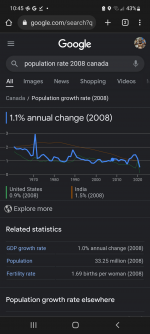So you admit there's growth. Not shrinking

Well it's good to realize when you're wrong.
And as it turns out you're wrong again. From (you asked for it), Statcan:
Released: 2022-09-28
Canada sees record population growth
In 2021/2022, Canada's population grew by a record 703,404 people (+1.8%) to reach an estimated 38,929,902 on July 1, 2022. This surpasses the preceding high observed a year before the COVID-19 pandemic (2018/2019), when the population grew by 536,146 people (+1.4%).
After a year of record low growth early in the pandemic (+0.6% in 2020/2021), Canada's population growth rate in 2021/2022 (+1.8%) reached a level that has not been seen in more than 50 years (+1.9% since 1965/1966), when the country was witnessing the end of the Baby Boom.
In 2021/2022, Canada's population grew by a record 703,404 people (+1.8%) to reach an estimated 38,929,902 on July 1, 2022. This surpasses the preceding high observed a year before the COVID-19 pandemic (2018/2019), when the population grew by 536,146 people (+1.4%).

www150.statcan.gc.ca
So our population grew by more than 38,000 people.
